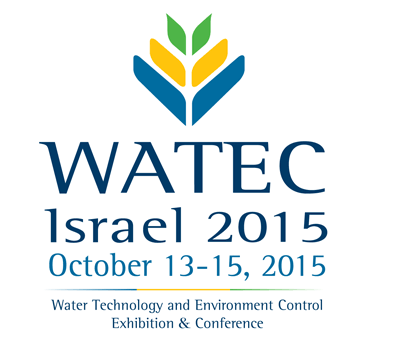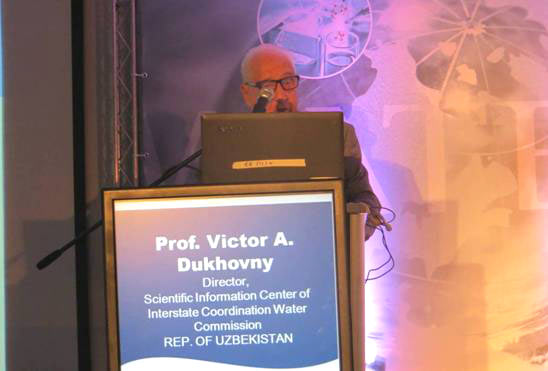WATEC 2015 CONFERENCE AND EXHIBITION
Director of SIC ICWC Prof. V. Dukhovny took part at the International Water Technology Conference and Exhibition in Tel-Aviv, Israel from 12 to 15 October 2015.
This event consisted of the meeting for investors to identify future prospective technologies, the international conference and the exhibition.

On 12th of October during the meeting of investors four groups of companies were represented and demonstrated their pilot proposals together with investors who contributed money to initial ideas and developments. All inventors in essence were the small teams of students or graduates, consisting of 3 to 15 young initiative creators who received small support from production and investment companies to realize their ideas in practice. Such approach saves the public money at initial stages of development, on the one hand, and allows young students and professionals to try their creative force in practice under the supervision of investors.
The Solex-Water company specializes on treatment of water through gas and oil industry. The proposed technologies help to have municipal water at a price of 47 cents per cubic meter.
The Aquanos company proposes biotechnology for cleaning effluents, with parallel production of biogas and biomass used for fertilizers. The technology was adopted for application in two enterprises in the US and Israel.
The Memtech company offers changeable membranes for treatment of water and effluents through ultraviolet treatment.
The Aquarius Spectrum company developed a system of monitoring over piped networks and for detection of leakages as small as 1.5 mm in them. Specific algorithm and sensory acoustic devices allow daily maintenance of large systems and reception of information through GSM. The technology was applied in 2015 in one of American systems serving four settlements.
The Aqua Rimat developed the Flowless technology, which detects leakage in the pipeline network and, at the same time, cuts water if leakages reach certain threshold. Besides, it controls both quantitative and qualitative water parameters. The technology helps to optimize water distribution between the user for equitable and sustainable distribution in the network. This technology is applied in Israel.
The Neotop company developed a module system for serving reservoirs, including the system of floating hemispheres that allow reducing evaporation from the reservoir surface by 90%, decreasing the water temperature, preventing blooming in the reservoirs and creating favorable conditions for fish breeding. This proposal won the 2014 Prime-Minister award.
The ICS developed the system of cyber-security, which protects infrastructure from potential cyber-attacks against monitoring systems. Recent experience has shown that we need the systems than can quickly rehabilitate its operation.
The Aqualens company created a very small ozone generator, which can ozonize both stationary and mobile systems for urban, rural and private effluent treatment on the base of solar batteries. The plant capacities are from 1,000 to 100,000 liters per day. This generator is used in Israel.
The Renergy Water technology was developed by the company with the same name for reduction of energy consumption in desalination plants based on reverse osmosis technology.
The Super Spectra technology is based on spectroscopy and allows detecting pollutants of any size in minimal concentrations.
Based on presentations, the participants voted to determine the winner. The Aquanos company became the winner and won a package of subsidies from the Ministry of Industry, Trade and Labor.
The International Conference on Water Technologies and Environmental Control opened the next day at the Tel-Aviv Convention Center. The welcome speeches were delivered by Aryeh Machluf Deri, Minister of Economy, Minister of the Development of the Negev and Galil, Dr. Yuval Steinitz, Minister of National Infrastructures, Energy and Water Resources, Avi Gabai, Minister of Environmental Protection, H.E. William Samoei Ruto, Deputy President, Republic of Kenya, Nairobi, Doug Ducey, Governer of the State of Arizona, and Alex Kushnir, CEO of the Israel Water Authority.
Very dry land occupies 60 % of Israeli area. Nevertheless, the country managed to irrigate its 60% of desert with waste water during the dry period of 2004-2012. In five years the national government invested 2 billion US dollars to desalination; consequently, water resources were augmented by 750 million cubic meters a year. This allowed solving the problem of water scarcity and meeting obligations towards Palestine and Jordan regarding an increase of environmental flow in the Jordan River by 50 million cubic meters a year. Implementation of IWRM started 20 years ago and oriented towards environmental improvement in the country has proven its value. Here, Israel follows the rule that first of all it is necessary to use its internal possibilities as far as possible and only afterwards use desalinated seawater for compensation of water scarcity.
The former Israeli Prime-Minister Shimon Peres took part in the opening of the Conference and delivered his informal speech:

Mr. Peres talked about water development in Israel. Particularly he noted that they did have nothing except for human resources. He told that however nowadays, Israel had the top high-tech in land and water use in the world and was ready to share it. This has proven that human capabilities helped to achieve much even under very complex conditions. The modern science made it possible to adapt Israeli experience to any conditions under guidance of wisdom and analysis of the past. Mr. Peres underlined that there was no future without the past and in the future we should search for lessons from the past. He also told that water was infinite but we knew little about it and should treat it carefully so that to keep the nature. Water looked like politics - it was not discovered completely in the past and had unpredictable future!
Several reports were dedicated to common problems of the U.S. western states and Israel and to possibilities of applying Israeli experience in the U.S. Development of Israeli desalination technologies in California (IDE), Los-Angeles (C.Hernandez) and in Arizona (A.Putnam) was demonstrated. In general, more than 20 desalination plants based on the Israeli reverse osmosis technology were to be built in this part of the country. The total volume of desalination in the U.S. western coast by 2025 is supposed to be 0.63 km3 a year. This would be of much help in overcoming chronic water scarcity in western states.
In the session “Lessons from different regions all over the world”, the following speakers delivered their reports:
- the INBO Permanent Technical Secretary J-F Donzier,
- Prof. V.A.Dukhovny about water management in Central Asia “Between regional demands and national interests”,
- Dr. Gesner Olivier, about water management in Brazil, the most water-rich country, which however suffers from local water scarcity,
- Dr. Ramik Ashrafov, about experience of decentralized water treatment in Azerbaijan,
- Dinesh Kumar, about water management in Rajasthan state in India,
- Dr. Clive Lipchin, Director of Arava Institute’s Center, who presented lessons from implementation of six household demonstration plants for treatment of gray water and recycling in the Western Bank of Jordan River and in Israel using the Israeli technologies for wetland construction in combination with membrane bioreactor.

At the exhibition 179 companies presented their innovations, including:
- seawater desalination, with capacity of up to 150 million m3 a year;
- comprehensive set of solutions for treatment of industrial and household effluents, from the portable unit (GAL mobile) with capacity from 10 cubic meters per day to large plants serving cities with capacity of up to 400 million cubic meters per year. All these solutions are equipped with the system of programmed controllers and data processors that ensure automatic control at all stages of treatment, including post-operation control of treatment quality;
- wide range of solutions for monitoring of piped water supply, with detection of leakage immediately after its occurrence and with provision of uniform and optimal water supply to urban and rural users;
- low-pressure drip systems for both large-scale irrigation systems and small private farms and for complete service (irrigation, fertigation and air control) in greenhouses;
- plants for treatment of wastes into biomass, etc.
|